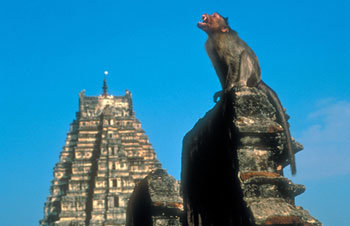Monkey King

Monkeys move in packs. Sometimes, they move in packs that are as little as a few monkeys; other times as many as hundreds live together. They arent all born equal; rather, they have hierarchies. Some are kicked out of the community. Monkeys arent only similar to humans in the biological respect; they resemble us in how they live, too.
The Cable TV National Geographic channel will air The Monkey Prince on December 13 at 11:00 p.m.
This program is a documentary that captures the lives of monkeys. However, it isnt just an ordinary documentary. The clips are arranged in a television-drama style. Thanks to the human staff, the monkeys now have names.
Bobo is the prince of a kingdom of monkeys who live below the mountains of India. Bobos father, Nine Fingers, is the leader of the pack. When the pack leader walks by, monkeys show their respect by averting their eyes or making room. Once again, we can ascertain the strict pecking order of monkeys.
One day, a fierce fight breaks out amongst the pack. A monkey named Long Teeth defies Nine Fingers but comes out with only a deep wound in his back to show for it. Living day to day in avoidance of Nine Fingers, Long Teeth finally ascends the throne when it is discovered that Nine Fingers never returned after a stroll down the mountain. Once a favorite of Nine Fingers, Bobo is unable to show loyalty to Long Teeth and is banished from the group.
The only way for an exiled monkey to survive is to join another community. Unless it does so, the harsh environment will probably kill the monkey. Bobo cautiously seeks asylum with another band of monkeys. After some persistence and stalking, Bobo is finally accepted into the new group. Intelligent Bobo obtains food easily and steals some from the human village. Gradually blending into the lot, Bobo, at long last, becomes the leader.
The program took two years for France Television to produce. As dramatic as it looks, there are some fictitious parts added; the scene in which a parent monkey who lost a child monkey takes pity on Bobo and takes him in, and the scene in which Bobo meets his childhood love are not quite true.
kimjy@donga.com







